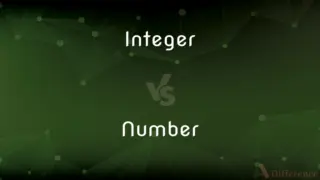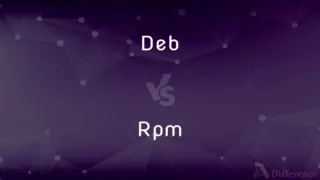Could vs. May — What's the Difference?
By Tayyaba Rehman — Updated on September 22, 2023
Could" suggests possibility or past ability; "May" implies permission or likelihood. Both are modal verbs with different nuances.

Difference Between Could and May
Table of Contents
ADVERTISEMENT
Key Differences
"Could" and "May" are both modal verbs in English, yet they convey different meanings and are used in distinct contexts. "Could" primarily denotes a possibility, often used to express something that someone was capable of doing in the past or a hypothetical situation in the present or future.
Conversely, "May" often signifies permission. For instance, when someone asks, "May I leave the room?", they're seeking consent. While "May" is used in formal situations to ask for or grant permission, it can also indicate possibility, particularly in situations that denote likelihood or a potential future event.
The historical use of "Could" and "May" further distinguishes their applications. "Could" is the past tense form of "Can", signifying an ability someone had in the past. For example, "She could swim when she was five" indicates a past capability. Meanwhile, "May" has its origins in permissions and wishes, seen in phrases like "May you live long."
The subtleties between "Could" and "May" are essential for learners and even native speakers to grasp. While "Could I go to the restroom?" and "May I go to the restroom?" seem similar, the former hints at the possibility, whereas the latter clearly seeks permission.
Comparison Chart
Primary Use
Indicates possibility or past ability
Implies permission or likelihood
ADVERTISEMENT
Tense
Past form of "Can"
Present form
Permission Aspect
Informal or indirect request
Formal request
Probability Aspect
Less certain
More certain
Example
"Could you help me?" (request)
"May I enter?" (seeking permission)
Compare with Definitions
Could
Suggestion or advice.
You could try rebooting the computer.
May
Seeking permission.
May I use your phone?
Could
Informal request.
Could you pass the salt?
May
Granting permission.
You may enter the room now.
Could
Past ability or skill.
She could play the piano beautifully as a child.
May
Expressing wishes.
May you have a prosperous year!
Could
Present or future possibility.
They could arrive any minute now.
May
May is the fifth month of the year in the Julian and Gregorian calendars and the third of seven months to have a length of 31 days. May is a month of spring in the Northern Hemisphere and autumn in the Southern Hemisphere.
Could
Uncertain prediction.
It could rain tomorrow, so bring an umbrella.
May
Expressing possibility
That may be true
He may well win
Could
Past of can
May
Used to ask for or to give permission
May I ask a few questions?
You may confirm my identity with your Case Officer, if you wish
Could
Inflection of can
May
Expressing a wish or hope
May she rest in peace
Could
Used as a past subjunctive (contrary to fact).
I think he could do it if he really wanted to.
I wish I could fly!
May
The fifth month of the year, in the northern hemisphere usually considered the last month of spring
The full system was deployed last May
The new model makes its showroom debut in May
Could
Used to politely ask for permission to do something.
Could I borrow your coat?
May
A hawthorn or its blossoms.
Could
Used to politely ask for someone else to do something.
Could you proofread this email?
May
The fifth month of the year in the Gregorian calendar. See Table at calendar.
Could
Used to show the possibility that something might happen.
We could rearrange the time if you like.
May
The springtime of life; youth.
Could
Used to suggest something.
You could try adding more salt to the soup.
May
The celebration of May Day.
Could
Past participle of can
May
To be strong; to have power (over).
Could
Something that could happen, or could be the case, under different circumstances; a potentiality.
May
To be able; can.
Could
Was, should be, or would be, able, capable, or susceptible. Used as an auxiliary, in the past tense or in the conditional present.
May
To be able to go.
May
To have permission to, be allowed. Used in granting permission and in questions to make polite requests.
You may smoke outside;
May I sit there?
May
Expressing a present possibility; possibly.
He may be lying;
Schrödinger's cat may or may not be in the box
May
Expressing a wish (with present subjunctive effect).
May you win;
May the weather be sunny
May
Used in modesty, courtesy, or concession, or to soften a question or remark.
May
To gather may, or flowers in general.
May
To celebrate May Day.
May
The hawthorn bush or its blossoms.
May
(archaic) A maiden.
May
An auxiliary verb qualifying the meaning of another verb,
How may a man, said he, with idle speech,Be won to spoil the castle of his health!
For what he [the king] may do is of two kinds; what he may do as just, and what he may do as possible.
For of all sad words of tongue or penThe saddest are these: "It might have been."
May
Liberty; permission; allowance.
Thou mayst be no longer steward.
May
Contingency or liability; possibility or probability.
Though what he learns he speaks, and may advanceSome general maxims, or be right by chance.
May
Modesty, courtesy, or concession, or a desire to soften a question or remark.
How old may Phillis be, you ask.
May
Desire or wish, as in prayer, imprecation, benediction, and the like.
May
A maiden.
May
The fifth month of the year, containing thirty-one days.
May
The early part or springtime of life.
His May of youth, and bloom of lustihood.
May
The flowers of the hawthorn; - so called from their time of blossoming; also, the hawthorn.
The palm and may make country houses gay.
Plumes that mocked the may.
May
The merrymaking of May Day.
May
The month following April and preceding June
May
Thorny Eurasian shrub of small tree having dense clusters of white to scarlet flowers followed by deep red berries; established as an escape in eastern North America
May
Indicating possibility.
She may come to the party tonight.
May
Presenting options.
You may choose the blue or the red one.
Common Curiosities
Is "May" more formal for asking permission?
Yes, "May I" is typically more formal than "Could I."
Are "Could" and "May" interchangeable?
Not always. "Could" often indicates possibility while "May" implies permission.
Can "Could" indicate a suggestion?
Yes, e.g., "You could try a different approach."
Can "Could" denote a past ability?
Yes, e.g., "She could dance when she was younger."
Does "Could" suggest a less certain possibility than "May"?
Generally, yes. "It could rain" is less certain than "It may rain."
Can I use "May" for hypothetical situations?
"Might", the past tense of "May", is more common for hypotheticals.
Can "May" express a wish?
Yes, as in "May your days be merry."
Does "Could" always indicate uncertainty?
Often, but not always, especially when referring to past abilities.
How does "Could" relate to "Can"?
"Could" is the past tense of "Can" and often refers to past abilities.
Is "May" linked to any other modal verbs?
"Might" is related, as the past tense form of "May."
Can "Could" indicate a missed opportunity?
Yes, as in "I could have won if I tried harder."
Is "May" used in formal writing?
Yes, especially when denoting permission or possibility.
Is "May" always about the present?
Mostly, but it can indicate future possibilities too.
How do "Could" and "May" differ in requests?
"Could" is more indirect; "May" is direct and often more polite.
When should I avoid using "May"?
When the context doesn't involve permission, possibility, or wishes.
Share Your Discovery

Previous Comparison
Integer vs. Number
Next Comparison
DEB vs. RPMAuthor Spotlight
Written by
Tayyaba RehmanTayyaba Rehman is a distinguished writer, currently serving as a primary contributor to askdifference.com. As a researcher in semantics and etymology, Tayyaba's passion for the complexity of languages and their distinctions has found a perfect home on the platform. Tayyaba delves into the intricacies of language, distinguishing between commonly confused words and phrases, thereby providing clarity for readers worldwide.












































